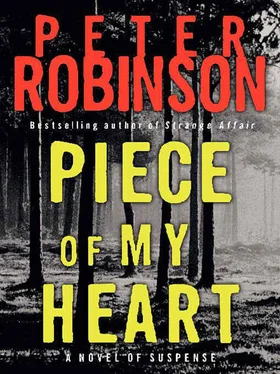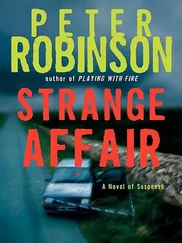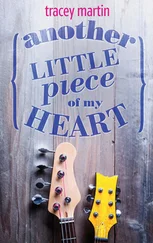“I’ve just been to see him and his bike’s not there.”
“He does go out from time to time.”
“Anywhere in particular?”
“He just rides. I don’t know where he goes. Look, are you telling me there’s some reason to be worried?”
“Not at all. I’m just trying to find him to ask him a few more questions.”
“What about?”
“Things seem to be coming to a head. I think we’re almost there.”
“You know who killed Nick Barber?”
“Not yet, but I think I’m getting close.”
“And Vic knows this?”
“I don’t know what he knows. I’ll bet he can be remarkably perceptive at times, though.”
“You never know with Vic. What goes in, what goes straight through.”
“Any idea where he might go?”
“No. I told you. He goes for bike rides from time to time. Helps keep him in shape.”
“If you hear from him, please let me know.”
“Okay.”
“One more thing, Mr. Adams.”
“Yes?”
“The night Robin Merchant drowned. Were you up and around at the time?”
“Who told you that?”
“Were you?”
“Of course not. I was fast asleep.”
“You and I both know that’s a load of bollocks, Mr. Adams, and the police probably knew it even then. They just didn’t have any evidence to suggest Robin Merchant might have been murdered, or that his death might have been caused by someone else in some way.”
“This is absurd. Is it Tania? Have you been talking to Tania?”
“Why would that make a difference?”
“Because she was pissed. If you’ve talked to her, she’s no doubt told you we were what they call an item at the time. Her drug of choice was alcohol. Vodka mostly. She was probably so drunk she didn’t know her arse from her elbows.”
“So you weren’t up and about?”
“Of course not. Besides, Tania’s got it in for me. We haven’t exactly been on the best of terms these past few years.”
That wasn’t exactly what Tania had told him, Banks remembered. Who was lying? “Oh. Why’s that?”
“A mixture of business and personal matters. And none of your business, really. Now, look, this connection’s getting worse and worse. I’m going to hang up now.”
“I’d like to talk to you again. Can you come by the station?”
“I’ll be passing nearby on my way to London next week. I’ll try to drop in if I have the time.”
“Try to make time. And ring first.”
“I will if I can remember. Good-bye, Mr. Banks.”
As Banks was putting his mobile away, he noticed he had voice mail waiting. Curious, he pressed the button and after the usual introduction heard Annie’s voice. “I hope things are going well with Vic Greaves,” she said. “Winsome and I seem to be making some progress here and we’d like to have a chat with you about the possibilities we’ve raised. Can you come back to the station as soon as you have a moment? It could be important. Cheers.”
Well, Banks thought, turning his car toward Eastvale and slipping in an old Roy Harper CD, Flashes from the Archives of Oblivion, at least someone was making progress.
Winsome said she didn’t need to use the online computer anymore, so they adjourned to the privacy of Banks’s office. The market square was busy with tourists and shoppers coming in and out of the narrow streets that radiated from it. The day was warming up, so Banks opened his window about six inches to let some fresh air in. The noise of the cars, snatches of music, laughter and conversations all sounded distant and muffled. A whiff of diesel fumes from the revving coaches drifted in.
“You’ve been busy, by the looks of it,” Banks said as Winsome dropped a pile of paper on his desk.
“Yes, sir,” she said. “I’ve been on the telephone or the Internet over three hours now, and I think you’ll find the results very interesting.”
“Go ahead.”
They sat in a semicircle around Banks’s desk so they could all see. “Well,” Winsome began, pulling out the first sheet, “let’s start with twelfth January, 1969. Top Rank Suite, Cardiff.”
“What happened there?” Banks asked.
“Nothing. At least not at the Top Rank Suite.”
“Where, then?”
“Hold your horses a minute,” said Annie. “Let Winsome tell it her own way.”
“I spoke with the archivist at one of the big newspapers down there,” Winsome went on, “the South Wales Echo, and he seemed surprised that somebody else was asking him about that particular date.”
“Somebody else?”
“Exactly,” Winsome went on. “It seems that Nick Barber did quite a bit of background work before he went up to Yorkshire, specifically into the Mad Hatters tour dates between the Brimleigh Festival and Robin Merchant’s death.”
“Which makes me wonder why he needed to check the web sites at Eastvale Computes and jot what he found down in the back of his book,” said Annie.
“John Butler, the editor at MOJO, told me that Barber was meticulous about checking his facts,” said Banks. “He checked everything at least twice before he went after a story. I should imagine he was getting it right, preparing for another chat with Vic Greaves.”
“Makes sense,” said Annie. “Go on, Winsome.”
“Well, sometimes he had to contact the local papers to see if they kept back issues, but mostly he didn’t need to. Most of what he wanted is available at the British Library Newspapers Catalogue, and he could read the papers on microfilm at the library’s newspaper reading room. His London phone records, by the way, show quite a few calls to the library, as well as to the local newspapers concerned, in Plymouth, Cardiff and Brighton.”
“What did he discover?”
“In the first place,” Winsome went on, “I should guess that he was simply looking for reviews of Mad Hatters performances. Maybe a few little quotes from the time to spice up his article. As you said, sir, he was thorough. And it looks as if he was also trying to get a broader context of the times, you know, little local snippets about what was going on that day in Bristol or Plymouth, what was of interest to the people there, that sort of thing. Background.”
“Nothing unusual in that, either,” Banks said. “He was a music journalist. I imagine he was also scrounging around for any old photos or live bootleg recordings he could find.”
“Yes, sir,” Winsome said. “Obviously he couldn’t research every gig – they played over a hundred towns and cities during that period – but he did cover a fair bit of ground in the reading room. I’ve spoken to the librarian he dealt with down there, and she was able to give me a list of what he did get around to and fax me prints from the microfilm reader of the newspapers for the three dates in question. She was very helpful. Sounded quite excited to be part of a police investigation. Actually, it was the issues on the days after the gigs that interested Barber, of course.”
“Because that was when the reviews appeared,” said Banks.
“Exactly. Well,” Winsome went on, there’s nothing especially interesting in the reviews. Apparently they were in good form that night, even Vic Greaves. It’s another item of news that I suspect was more interesting to Nick Barber.” She picked a sheet from her pile and turned it on the desk so that Banks could read it. “I’m sorry about the quality, sir,” she said, “but it was the best she could do at short notice.”
The print was tiny and Banks had to take out his reading glasses. The story was about a young woman called Gwyneth Harris, who was found dead in Bute Park, near the city center of Cardiff, at six o’clock in the morning of thirteenth January, by an elderly man walking his dog. Gwyneth had, apparently, been held from behind and stabbed five times in the heart with a blade resembling that of a flick-knife. There were no more details.
Читать дальше












